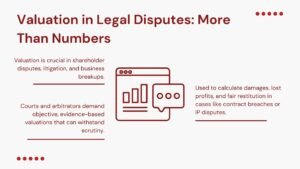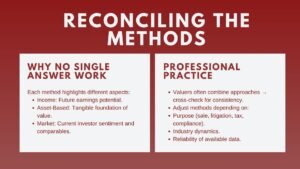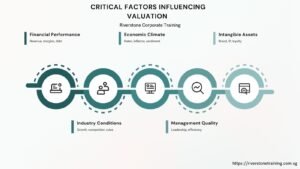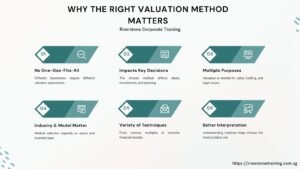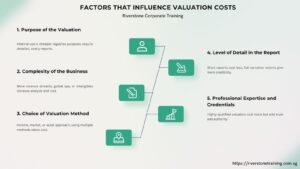Corporate Restructuring and Its Effect on Company Valuation Professional Training
Corporate Restructuring and Its Effect on Company Valuation: Professional Training
In the highly interconnected and competitive world of corporate finance, restructuring is one of the most defining strategic turning points that can spell out the long term success or failure of an organization. Whether a company is experiencing liquidity problems, preparing for a merger or acquisition, or re-organizing its business to gain greater efficiency and profitability, the process of corporate restructuring valuation training for financial professionals Singapore has a direct impact on the valuation of the business, general confidence in it, and its image in the marketplace. Thus, a strong knowledge of how to think about, plan for, and deliver restructuring programmes has become an essential skill not just for investment bankers, but also for corporate strategy, consulting and valuation advisory.
This professional training module is set up to equip the participants with a profound praxis understanding of the restructuring process from a financial as well as strategic point of view. It combines cutting-edge valuation models, technical modelling techniques and case examples to enable participants to accurately and confidently evaluate the financial implications of change within the corporate sector. By the end of the program, financial professionals will have the ability to assess, develop, and present new restructuring plans that optimise enterprise value alongside organisational transparency and trust across all stakeholders.
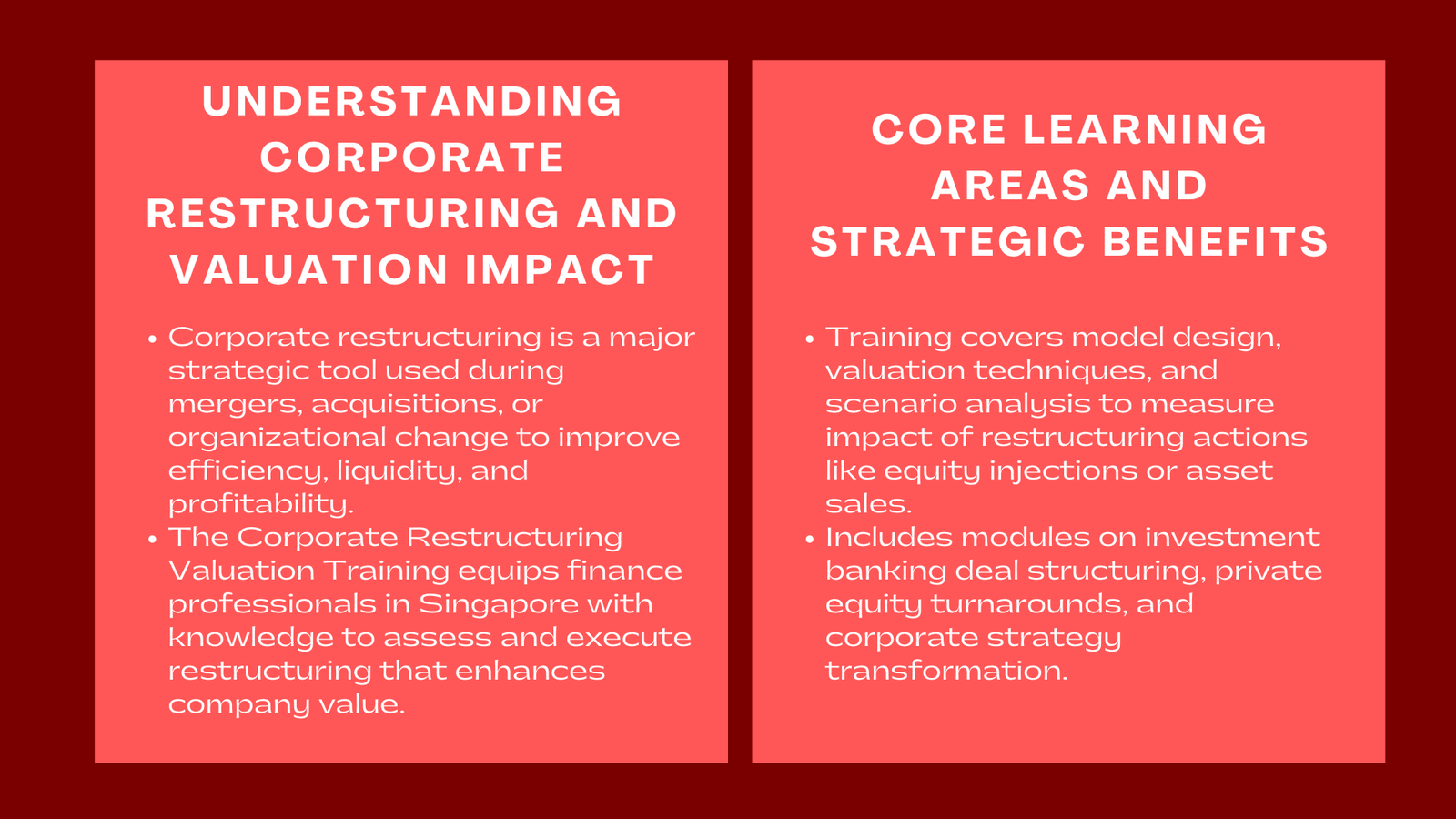
The Relevance of Corporate Restructuring Knowledge
Bridging Strategic Decisions and Valuation Outcomes
Corporate restructuring is much more than an accounting or legal restructuring that is about moving forward to reconnect the financial analysis with long-term corporate goals. Every decision related to restructuring, ranging from divestiture, debt refinancing, mergers, recapitalization, among others, have measurable ramifications for company valuation. Understanding these cause and effect relations is very important for financial professionals tasked with leading their organizations in a strategic direction, and leveraging company valuation services Singapore can provide deeper insights into how restructuring decisions impact enterprise value and long-term financial performance.
Participants of this training learn to view restructuring decisions from the perspective of enterprise value (EV), equity value and total shareholder return. They also investigate how changes in capital structure, cost of capital or allocation of cash flows may influence or affect the value of a firm. For example, debt reduction efforts which may boost liquidity and investor confidence might well dilute shareholder value if bought with excessive equity issuance. The program therefore places emphasis on the interdependence between financial strategy and valuation with the training participants learning how to evaluate the outcome of restructuring not in isolation but as part of a larger business transformation strategy.
Navigating Complex Deal Structures
Modern restructuring transactions are very rarely simple. They are commonly characterised by hybrid financing instruments, multi-jurisdictional involvement, cross-border tax considerations and conflicting stakeholder interests. From leveraged recapitalizations to distressed M&A transactions, a range of sophisticated analysis is involved in these transactions, combining a mix of financial modeling, risk analysis, and legal understanding. Workers attending this program become exposed to the usage of cutting-edge modeling tools to compare and contrast various restructuring alternatives under standing economic and regulatory conditions. This exposure makes sure that they are able to adjust their valuation approaches to the unique complexity of the real world in restructuring scenarios, ranging from turnaround situations to strategic consolidations.
Core Areas of the Corporate Restructuring Training
Model Design and Structuring for Restructuring Scenarios
The basis of successful restructuring analysis is the development of accurate, flexible and transparent financial models. Throughout the training, participants are educated in building integrated financial models, which reflect the cascading effect of major restructuring actions such as asset sales, debt write-offs, equity injections or spin-offs. Model architecture is developed for ensuring logical flow between assumptions, calculations, and output and to include error checking mechanisms and sensitivity frameworks.
Through case-based exercises, trainees learn how to simulate the results of restructuring and learn how to understand the impact of balance sheet adjustments, reorganization costs, or capital structure changes on some important valuation metrics such as EBITDA multiples, internal rate of return (IRR), and enterprise value. The practical focus on model design guarantees that the participants are not only technically sound, but also able to understand the financial implications of the process behind each and every restructuring decision with strategic clarity.
Valuation Techniques in Restructuring Contexts
Valuation is the key to any restructuring initiative as stakeholders trust valuation analysis so that they can negotiate terms of restructuring, share losses/gains, and determine capital structures in the future. The program deals with a variety of valuation methodologies that can be applied to a range of restructuring circumstances. Participants learn to use discounted cash flow (DCF) analysis under restructuring scenarios, by combining adjusted financial projections, costing restructuring and relating new terminal values to new business realities.
They also develop skills in similar company and precedent transaction analyses, with an emphasis on those related to distressed or special-situation comparables that will more accurately reflect market behavior during financial stress. Additionally, the module covers adjusted book value as well as liquidation valuation methods which are important in cases of insolvency, divestiture or wind-down. With these frameworks, participants acquire a clear appreciation of what it means to assess fair value, and to convey valuation findings in a way that is useful for negotiations, while at the same time making sure that the conclusions reached are the right ones for the strategic goals and expectations of the stakeholders.
Sensitivity and Scenario Analysis
The entire restructuring process is marked by uncertainty. Market volatilities, governmental intervention and unpredictable recovery rates can all impact the outcome of a restructuring strategy. This module explains to the participants how to conduct comprehensive sensitivity and scenario analysis to test the robustness in valuation by varying assumptions. For instance, changing key parameters like reducing cost savings achieved, increasing growth rates of revenues or adjusting the financing terms can drastically change the results of valuation.
Based on the best-case, base-case and worst-case simulation, participants get to know to derive value Drivers, evaluate downside risks and communicate risk-adjusted valuations to management teams, boards and external stakeholders. This process will help to improve their capacity to make decisions based on complex financial data and create a systematic approach to risk management in restructuring situations.
Integrating Accounting, Finance, and Strategy
Restructuring is by definition multidisciplinary. It demands that professionals choose to combine into one analytical frame accounting standards, financial management principles and strategic foresight. In this training, customers are introduced to the reconciliation of economic adjustments on financial statements such as impairment charges, asset devaluations, and reorganisation cost with the valuation effect over the long term.
The course also discusses the impact of strategic decisions such as divestitures, mergers or carve-outs on drivers, operational, cost and shareholder value creation. For example, a divestiture may increase short term liquidity, but it may risk losing out on a future revenue stream: in turn, this may impact intrinsic value. It is these trade-offs that, if understood, allow participants to make concessions between the need to address short term financial constraints whilst still generating value, and to harmonise the outcomes of restructuring with the wider corporate strategy.
Practical Application in Corporate Finance and Investment Banking
Investment Banking: Deal Structuring and Advisory
For investment bankers, restructuring is a challenge and an opportunity to deliver value with innovation and precision. This module is dedicated to how financial modeling, advanced financial modeling, can be used by bankers to work on developing correct turnaround deals, advise on merger of distressed entities, and provide support to clients through the creditors. Participants learn to build post-restructuring capital structure models that evaluate possible synergies, integration costs and performance measures.
Hands-on simulations allow them to rationalize the cost of transactions, prepare pitch materials and assemble client-ready valuation reports that will stand up under close scrutiny. By learning these analytical and presentation skills, participants increase their credibility and effectiveness in completing their complex restructuring transactions which, in turn, builds strong client relationships and deal outcomes.
Private Equity: Distressed Investment and Exit Strategy
In private equity, corporate restructuring is key to uncovering undervalued opportunities and turning them into profitable investments. This module of the training focuses on leveraged recapitalizations, debt equity swaps or turnaround in operations as a way for private equity professionals to boost internal rate of return (IRR) and multiple on invested capital (MOIC).
Also participants learn as to how to create performance dashboards that track key operational and financial indicators over the restructuring lifecycle. These analytical tools enable funds to see the money returning, having the possibility to assess the exit moment and the change of strategy, which is the most important for.In real time, adaptive strategic corporate restructuring course for investment banking and private equity Singapore are possible. As a result, PE investors have only the insight necessary to maximize portfolio performance and capture value in competitive and rapidly changing markets.
Corporate Strategy: Organizational Transformation
Beyond the finance professional, those involved in this training are also corporate executives, CFOs and strategic planners who have a role to play in guiding change within the organisation. The module offers models of transformation project financial evaluation, such as workforce restructuring, project digitalization, and strategic disposals. Participants are instructed in determining whether a restructure will be advantageous to long term valuation or has hidden financial and operational risks. By understanding these analytical frameworks, leaders can make informed decisions that are based on data and improve the efficiency and enterprise value.
Developing Strategic and Analytical Excellence
Building Decision-Making Mindsets
While modeling in the technical sense stands at the heart of the program, the importance of decision making is given as much attention. Participants gain an understanding of how to think of financial dealings as situations of “valuation under uncertainty” that can allow them to understand the context of strategic trades underlying quantitative counterparts. This mindset may be especially critical when deciding if to pursue, delay or abandon a restructuring initiative. By practicing the analysis of complex financial issues with a strategic perspective, participants become professionals that can aid organizations with adjustments through financial turbulence with confidence and vision.
Enhancing Communication and Negotiation Skills
The restructuring environments are characterized by the complexity of communication such that stakeholders ranging from creditors to shareholders need to be convinced of the fairness and feasibility of proposed plans. The training focuses on understanding how to communicate complex valuation messages in clear narratives that communicate to the decision makers. Particularly, participants practice real-life exercises for negotiation and persuasive communications in order to be able to express valuation assumptions, defend recommendations and negotiate terms during high-value discussions with credibility.
Integrating Technology and Automation
Advanced Excel, VBA, and Financial Databases
As financial analysis becomes more technological in today’s financial world, more and more of these recasts are backed by the use of robots for dynamic reporting and integration of data in real time. Participants learn to extend classic Excel based models using VBA scripting resources and integrating financial data into models from a variety of financial data sources, such as Bloomberg and Capital IQ. These skills can help them automate data updates, lower down the manual errors, and generate more responsive and transparent models that can work with decision-making under strict timelines.
Linking Valuation Models with Data Analytics
The training also goes into the intersection between financial modeling and data analytics. When analytics platforms become well integrated with valuation models, these can automatically generate live dashboards which show market performance and the ability to instantly run restructuring scenarios and simulations through Power BI or Tableau. This integration of technology allows knowledgeable professionals to be equipped with the ability to monitor changes in valuation in real-time and show data-backed insights which can help in making strategic decisions in real time.
Benefits of Corporate Restructuring Training
Professional Advancement
Mastery of restructuring valuation gives the participant a competitive edge in the financial job market today. Investment banks, as well as consulting firms and corporate finance departments, increasingly want professionals who are able to work with complex transitions in an analytical manner with strategic insight. The graduates of the training become a well-balanced professional capable of dealing with financial distress, to explore restructuring options and to serve as expert advisor valuation(c equilibrium and transaction valuation), with no compromise on quality.
Strategic Agility
The ability to be flexible in valuation models, understand financial results under pressure and be able to make actionable recommendations in volatile environments, is what sets outstanding finance professionals apart. Through hands-on practice and scenario-based learning, participants learn to be agile about understanding the dynamics of capital structures, forecasting the performance of post-restructuring companies and providing advice with confidence even when faced with uncertainty.
Institutional Value Creation
On top of the individual benefit, organizations that invest in this training have stronger analytical capabilities and improve their internal decision-making mechanisms. This means that teams of expert restructuring valuation consultants will always be better positioned to reduce the errors in modeling, enhance the accuracy of deal execution, and steadfast consistency in financial reporting. This creates a culture of analytical rigor and transparency within the organization and builds strategic alignment, which enables value creation in the long term.
Conclusion to Corporate Restructuring and Its Effect on Company Valuation Professional Training
Global financial restructuring is a challenge and an opportunity to the global corporate community. When done strategically, it can result in efficiency, restore competitiveness and create sustainable value for all stakeholders. This is why consultants who can handle the analytical and strategic aspects of restructuring are so important to any organization undergoing change. This Professional Training in Corporate Restructuring and Its Effect on Company Valuation is beyond technical modeling – creating strategic thinking, analytical insight, and technology literacy. Taken together, these competencies enable participants to make restructuring from a reactive necessity into a proactive impeller for the creation of long-term corporate value.



